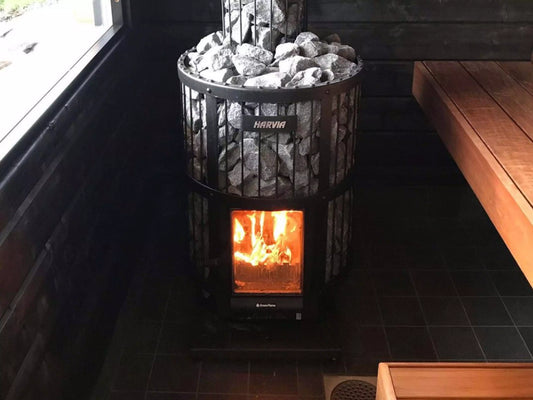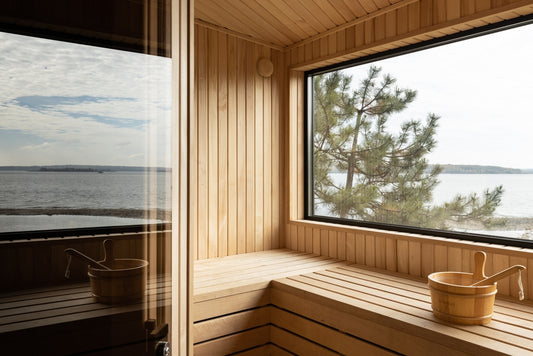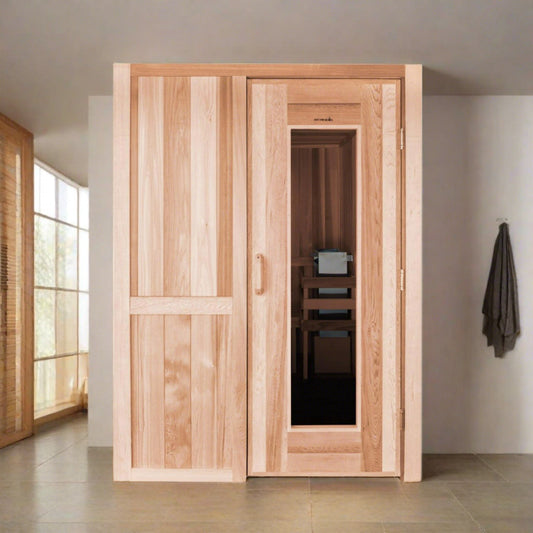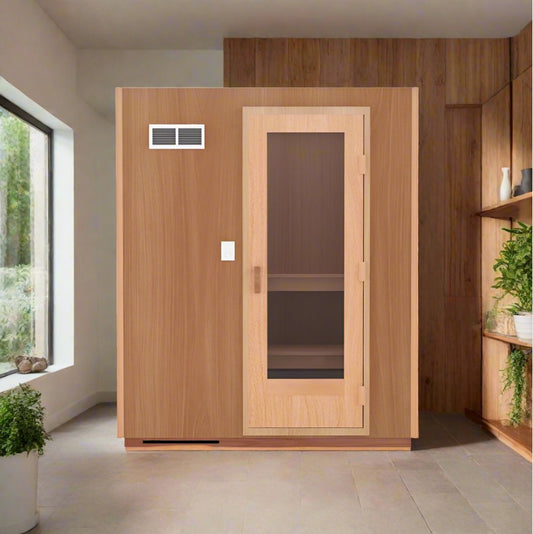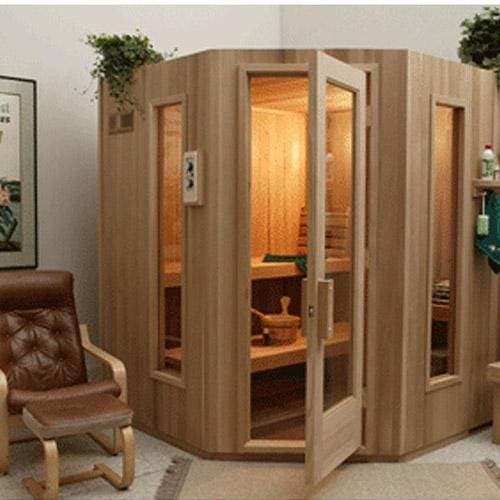Choose the right sauna heater.
There are four types of sauna heaters: gas, electric, wood-burning, and infrared. Choosing your sauna heater will highly depend on your budget and personal preferences. It's essential to know their differences, even if they are designed to do the same job.
The heater is the heart of the sauna; hence choosing the right one is such an important decision. With this in mind, we've decided to list the most important aspects of each type of heater. We hope this information helps you understand their main differences and makes it easier for you to decide which is the best option.
Gas heaters
Gas heaters can be fired with natural gas or liquid propane and take 30-60 minutes to heat a room to temperature. Gas heaters are an excellent option for people looking for a "cost-effective" and "energy-efficient" way to heat their home sauna. This type of heater is mostly utilized in large or frequently used saunas, such as gyms or spas since gas is usually a cheaper energy source. Furthermore, gas-fueled sauna heaters tend to need fewer replacements of costly elements.
Let's look at some of the science behind gas heaters and the cost of running them.
Propane or natural gas is a primary energy source, whereas electricity is secondary; that is to say, propane is used "as is," and electricity needs to be created by another energy source. Running a 40k BTU sauna heater will have an average cost of $0.58 (USD) per hour, $9.28 a month, and $111.36 a year (assuming you are using your sauna four times a week.) A 40k BTU heater can be used in rooms measuring up to 616 cubic feet.
If you plan your sauna to have lots of use or you want to get a large sauna, a gas heater might be the right option for you.
Electric heaters
Electric heaters are an excellent option for people that want to flick a switch and enjoy a relaxing sauna bath. This type of heater is considered the most practical as it has a fast heat-up time. They can be programmed to turn on at a designated time; this can be very convenient for people who just want to get home from a long day at work and hop in their sauna.
Electric heaters can take anywhere from 20 to 45 minutes to heat a room to temperature, depending on the room's size. Also, the temperature from electric heaters can be precisely regulated with a remote controller, an adjustable thermostat, or an app on your phone, thus making a sauna experience feel constantly pleasant.
Are electric sauna heaters expensive to run?
The reality is that electric heaters are actually pretty cheap. The energy cost of an electric sauna heater will vary depending on where you live and the model you choose. Running a 4.5 kW heater (assuming you use it four times a week) will have an average cost of $0.93 (USD) per hour; that makes it $14.88 a month and $178.56 a year. A 4.5 kW electric heater has enough power to heat a room measuring 140 to 210 cubic feet.
Now, let's compare the average monthly cost of running an electric heater with a gym or spa membership. You'll see that running an electrical heater is indeed very cheap. According to a study by RunRepeat, the average monthly cost for gym memberships can range from "$31.00 for lower-tier memberships to $44.42 on higher-tier memberships." That is a whopping $533.04 a year for high-tier memberships.
If convenience and time efficiency is what you are looking for, then an electric sauna heater might be just right for you.
Wood-burning heaters
When looking for the most traditional experience, sauna enthusiasts generally mention "wood-fueled heaters." This type of sauna is used in areas where electricity is difficult to access or simply not available, and it can take between 30 to 60 minutes to heat a room to temperature. Wood-burning stoves are mostly used in medium to large saunas due to the heat produced, and although heat can be a bit tougher to regulate, the heat tends to be warmer and more fitting for a sauna.
Many people place their saunas off-the-grid, near rivers or lakes, as they love jumping into them to cool off from their deep-sweat sauna sessions. Others love the calming crackling fire sound from a wood-burning heater and place it in their home saunas.
Are wood-burning heaters cost-efficient?
To answer that question, we need to look at a few things. If you're in a big city, without a forest in your backyard, you'll have to buy wood. Softwood can cost $300/cord, and a cord of hardwood can run up to $600 or more, whereas if you live in an area where bringing wood home is an everyday thing, this type of heater will be the cheapest option for you.
If you were planning on placing your sauna outdoors or off-the-grid, then a wood-fueled stove might be what you're looking for.
Infrared saunas
Although not being mentioned above as one of the main types of heaters, infrared saunas are also a thing. This type of heater is rapidly gaining mainstream popularity due to being very efficient and beneficial for your health.
How do infrared saunas work?
Unlike a traditional sauna, infrared saunas don't heat an entire room, instead, your body gets heated with deep penetrating waves. This type of heaters ake 10-20 minutes after turning them on to be ready for use. These heaters use ceramic or carbon panels that emit infrared waves that easily penetrate the body. As your body absorbs the infrared heat, thermal energy increases, which begins the sweating process.
The temperature in an infrared sauna can range anywhere from 120˚F to 140˚F (48˚C to 60˚C,) which is lower than traditional saunas. Traditional saunas operate with temperatures between 150˚F to 175˚F. The difference in temperatures is due to how infrared waves deeply penetrate the body's tissue with ease.
Is running an infrared sauna expensive?
Infrared saunas are very cheap to run. You can expect an infrared sauna to consume $10 to $15 a month worth of energy (depending on where you live and the size of your sauna.)
Conclusion on choosing the right heater
All sauna heaters have strengths and weaknesses, but they all offer the same thing, a relaxing and health-beneficial session. Remember, no matter which sauna heater you end up going for; the most important thing will always be that you enjoy the experience!
We hope you find this information helpful. Stay healthy, sauna enthusiasts!


